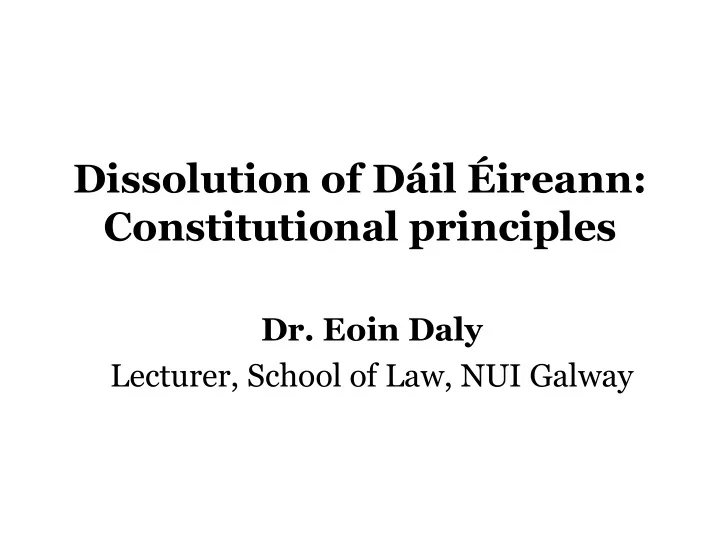

Dissolution of Dáil Éireann: Constitutional principles Dr. Eoin Daly Lecturer, School of Law, NUI Galway
I. The power of dissolution and its significance
I. The power of dissolution and its significance • Power to control timing of general elections.
I. The power of dissolution and its significance • Power to control timing of general elections. • Effect on balance of power in political systems.
I. The power of dissolution and its significance • Power to control timing of general elections. • Effect on balance of power in political systems. • How might the power be limited/checked?
I. The power of dissolution and its significance • Power to control timing of general elections. • Effect on balance of power in political systems. • How might the power be limited/checked? - Legally fixing parliamentary term - Power of veto/refusal/oversight
II. The term of Dáil Éireann
II. The term of Dáil Éireann “The same Dáil Éireann shall not continue for a longer period than seven years from the date of its first meeting: a shorter period may be fixed by law.” - Article 16.5
II. The term of Dáil Éireann “The same Dáil shall not continue for a longer period than five years from the date of its first meeting.” - Electoral Act, 1992, s. 33
III. Taoiseach’s power to advise dissolution
III. Taoiseach’s power to advise dissolution The law provides only for a maximum term, not a fixed term.
III. Taoiseach’s power to advise dissolution “ Dáil Éireann shall be summoned and dissolved by the President on the advice of the Taoiseach .” - Article 13.2.1 °
IV. Limits on Taoiseach’s power
IV. Limits on Taoiseach’s power • Reasons for limiting the power?
IV. Limits on Taoiseach’s power “The President may in his absolute discretion refuse to dissolve Dáil Éireann on the advice of a Taoiseach who has ceased to retain the support of a majority in Dáil Éireann .” - Article 13.2.1 ° (emphasis added).
V. The presidential power: ambiguities
V. The presidential power: ambiguities • Ambiguity concerning circumstances in which power is triggered
V. The presidential power: ambiguities • Ambiguity concerning circumstances in which power is triggered “The President may in his absolute discretion refuse to dissolve Dáil Éireann on the advice of a Taoiseach who has ceased to retain the support of a majority in Dáil Éireann .” • Meaning of “ceased to retain the support of a majority” not defined in case law .
V. The presidential power: ambiguities • Meaning of loss of “majority support”? - Formal votes of confidence
V. The presidential power: ambiguities • Meaning of loss of “majority support”? - Formal votes of confidence - Defeats on “confidence and supply” votes
V. The presidential power: ambiguities “A defeat on a budget resolution is clearly one such [confidence] issue. Votes on other matters may be converted into motions of confidence by a declaration from the Taoiseach that he considers the vote to be such. Defeats on issues of intermediate importance are usually cured by securing a victory on an early vote of confidence and thereby avoiding the obligation to resign.” - Hogan and Whyte, JM Kelly: The Irish Constitution (Dublin: Butterworths, 2003), p. 208
V. The presidential power: ambiguities • Meaning of loss of “majority support”? - Formal votes of confidence - Defeats on “confidence and supply” votes
V. The presidential power: ambiguities • Meaning of loss of “majority support”? - Formal votes of confidence - Defeats on “confidence and supply” votes - Loss of support without formal vote? Extraneous events taken into account?
V. The presidential power: ambiguities “It is arguable that the exercise of the Presidential discretion … to refuse to dissolve the Dáil should not be limited to cases in which a formal vote of no confidence in the Taoiseach has been taken, for otherwise a Taoiseach who had lost the support of a majority of the Dáil could pre-empt such a vote and insist the President grant a dissolution in accordance with Article 13.2.1 °.” - Hogan and Whyte, p. 208
V. The presidential power: ambiguities Meaning of “majority”? Position of minority governments? “All questions in each House … shall be determined by a majority of the votes of the members present and voting … ” - Article 15.11, emphasis added.
VI. Judicial Guidance? “The President shall not be answerable … to any court for the exercise and performance of the powers and functions of his office.” - Article 13.8
VI. Judicial Guidance? “... speeches or writings outside the House, party meetings, speeches or activities inside the House short of actual voting… are all capable of contributing evidence to indicate what action this or that member has decided to take … there are many good arguments to discourage a Governor from exercising his power … except upon indisputable evidence of actual voting in the House, but it is nonetheless impossible to say that situations cannot arise in which these arguments are outweighed by considerations which afford to the Governor the evidence he is to look for, even without the testimony of recorded votes . ” Adegbenro v Akintola [1963] AC 614, 618 (Lord Radcliffe)
VII. The presidential power of refusal in practice
VIII. The constitutionality of a Fixed Term Parliament Act?
VIII. The constitutionality of a Fixed Term Parliament Act? “ Dáil Éireann shall be summoned and dissolved by the President on the advice of the Taoiseach.” - Article 13.2.1 °
Recommend
More recommend